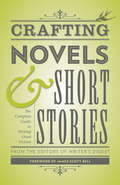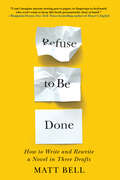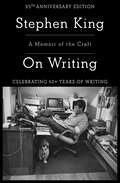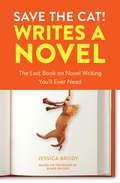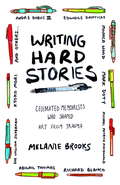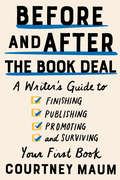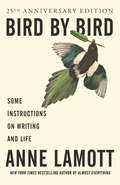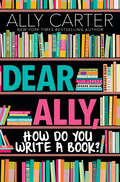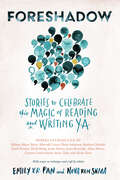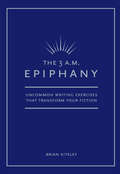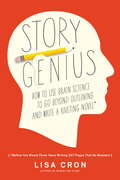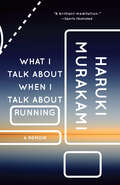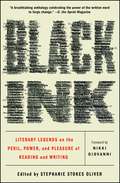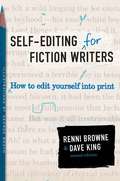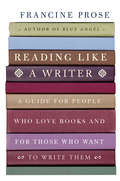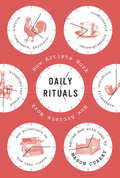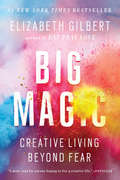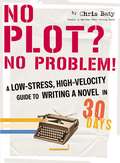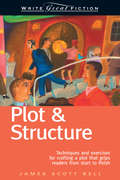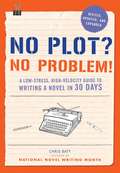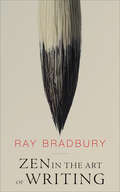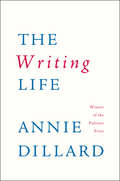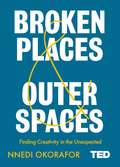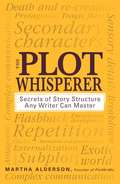Special Collections
NaNoWriMo
Description: Are you participating in National Novel Writing Month (NaNoWriMo)? If so, get started with some craft books on writing and revising! #writing #writer #nanowrimo #nationalnovelwritingmonth
- Table View
- List View
Crafting Novels & Short Stories
by Editors of Writer's DigestLearn How to Create Stories That Captivate Agents, Editors, and Readers Alike! Inside you'll find the tools you need to build strong characters, keep your plots moving, master the art of dialogue, choose the right point of view, and more. This comprehensive book on the art of novel and short story writing is packed with advice and instruction from best-selling authors and writing experts like Nancy Kress, Elizabeth Sims, Hallie Ephron, N.M. Kelby, Heather Sellers, and Donald Maass, plus a foreword by James Scott Bell. You'll learn invaluable skills for mastering every area of the craft: Define and refine your characters. Make your plot and conflict high-energy and intense. Hone your story's point of view. Create a rich setting and backstory. Craft dialogue that rings true. Select the right words and descriptions throughout your story. Revise your story to perfection. Throughout you'll find supplemental sections that cover special topics like getting started, beating writer's block, researching your work, and getting published. They'll help you integrate your skills into a balanced, productive, and fulfilling career. Whether you're writing flash fiction, a short story, a novel, or an epic trilogy, you'll come away with the tools you need for strong and effective storytelling.
Refuse to Be Done: How to Write and Rewrite a Novel in Three Drafts
by Matt BellThey say writing is rewriting. So why does the second part get such short shrift? Refuse To Be Done will guide you through every step of the novel writing process, from getting started on those first pages to the last tips for making your final draft even tighter and stronger. From lauded writer and teacher Matt Bell, Refuse to Be Done is encouraging and intensely practical, focusing always on specific rewriting tasks, techniques, and activities for every stage of the process. You won&’t find bromides here about the &“the writing Muse.&” Instead, Bell breaks down the writing process in three sections. In the first, Bell shares a bounty of tactics, all meant to push you through the initial conception and get words on the page. The second focuses on reworking the narrative through outlining, modeling, and rewriting. The third and final section offers a layered approach to polishing through a checklist of operations, breaking the daunting project of final revisions into many small, achievable tasks. Whether you are a first time novelist or a veteran writer, you will find an abundance of strategies here to help motivate you and shake up your revision process, allowing you to approach your work, day after day and month after month, with fresh eyes and sharp new tools.
On Writing
by Stephen KingCELEBRATING 50 YEARS OF WRITING with fresh testimonials from fellow writers about why they love Stephen King and On Writing—and a few new words on the joy of writing from King himself. *ONE OF TIME MAGAZINE&’S TOP 100 NONFICTION BOOKS OF ALL TIME* Immensely helpful and illuminating to any aspiring writer, this special edition of Stephen King&’s critically lauded, million-copy bestseller shares the experiences, habits, and convictions that have shaped him and his work. &“Long live the King&” hailed Entertainment Weekly upon publication of Stephen King&’s On Writing. Part memoir, part master class by one of the bestselling authors of all time, this superb volume is a revealing and practical view of the writer&’s craft, comprising the basic tools of the trade every writer must have. King&’s advice is grounded in his vivid memories from childhood through his emergence as a writer, from his struggling early career to his widely reported, near-fatal accident in 1999—and how the inextricable link between writing and living spurred his recovery. Brilliantly structured, friendly and inspiring, On Writing will empower and entertain everyone who reads it—fans, writers, and anyone who loves a great story well told.
Save the Cat! Writes a Novel
by Jessica BrodyThe first novel-writing guide from the best-selling Save the Cat! story-structure series, which reveals the 15 essential plot points needed to make any novel a success.Novelist Jessica Brody presents a comprehensive story-structure guide for novelists that applies the famed Save the Cat! screenwriting methodology to the world of novel writing. Revealing the 15 "beats" (plot points) that comprise a successful story--from the opening image to the finale--this book lays out the Ten Story Genres (Monster in the House; Whydunit; Dude with a Problem) alongside quirky, original insights (Save the Cat; Shard of Glass) to help novelists craft a plot that will captivate--and a novel that will sell.
Writing Hard Stories
by Melanie BrooksAcclaimed memoirists describe the process of writing their most painful memoriesWriting Hard Stories encourages all writers as they work to craft honest memoirs. Some of the country’s most admired authors describe their own treks through dark memories and breakthrough moments and attest to the healing power of putting words to experience.“Why we endeavor collectively to write a book or paint a canvas or write a symphony...is to understand who we are as human beings, and it’s that shared knowledge that somehow helps us to survive.”—Richard Blanco“Here’s what you need to understand: your brothers [or family or friends] are going to have their own stories to tell. You don’t have to tell the family story. You have to tell your story of being in that family.”—Andre Dubus III“We all need a way to express or make something out of experiences that otherwise have no meaning. If what you want is clarity and meaning, you have to break the secrets over your knee and make something of those ingredients.”—Abigail Thomas“What we remember and how we remember it really tells us how we became who we became.”—Michael Patrick MacDonald“The reason I write memoir is to be able to see the experience itself...I hardly know what I think until I write...Writing is a way to organize your life, give it a frame, give it a structure, so that you can really see what it was that happened.”—Sue William Silverman“After a while in the process, you have some distance and you start thinking of it as a story, not as your story...It was a personal grief, but no longer personal...[It’s] something that has not just happened to me and my family, but something that’s happened in the world.”—Edwidge Danticat“Tibetan Buddhists believe that eloquence is the telling of a truth in such a way that it eases suffering...The more suffering that is eased by your telling of the truth, the more eloquent you are. That’s all you can really hope for—being eloquent in that fashion. All you have to do is respond to your story honestly, and that’s the ideal.”—Kate Bornstein“You can never entirely redeem the experience. You can’t make it not hurt anymore. But you can make it beautiful enough so that there’s something to balance it in the other scale. And if you understand that word beautiful as not necessarily pretty, then you’re getting close to recognizing the integrative power of restoring the balance, which is restoring the truth.”—Richard Hoffman
Before and After the Book Deal
by Courtney MaumEverything you’ve ever wanted to know about publishing but were too afraid to ask is right here in this funny, candid guide written by an acclaimed author.There are countless books on the market about how to write better but very few books on how to break into the marketplace with your first book. Cutting through the noise (and very mixed advice) online, while both dispelling rumors and remaining positive, Courtney Maum's Before and After the Book Deal is a one–of–a–kind resource that can help you get your book published.Before and After the Book Deal: A Writer's Guide to Finishing, Publishing, Promoting, and Surviving Your First Book has over 150 contributors from all walks of the industry, including international bestselling authors Anthony Doerr, Roxane Gay, Garth Greenwell, Lisa Ko, R. O. Kwon, Rebecca Makkai, and Ottessa Moshfegh, alongside cult favorites Sarah Gerard, Melissa Febos, Mitchell S. Jackson, and Mira Jacob.Agents, film scouts, film producers, translators, disability and minority activists, and power agents and editors also weigh in, offering advice and sharing intimate anecdotes about even the most taboo topics in the industry. Their wisdom will help aspiring authors find a foothold in the publishing world and navigate the challenges of life before and after publication with sanity and grace.Are MFA programs worth the time and money? How do people actually sit down and finish a novel? Did you get a good advance? What do you do when you feel envious of other writers? And why the heck aren’t your friends saying anything about your book? Covering questions ranging from the logistical to the existential (and everything in between), Before and After the Book Deal is the definitive guide for anyone who has ever wanted to know what it’s really like to be an author.
Bird by Bird
by Anne LamottNEW YORK TIMES BESTSELLER • An essential volume for generations of writers young and old. The twenty-fifth anniversary edition of this modern classic will continue to spark creative minds for years to come. Anne Lamott is "a warm, generous, and hilarious guide through the writer&’s world and its treacherous swamps" (Los Angeles Times). &“Superb writing advice…. Hilarious, helpful, and provocative.&” —The New York Times Book ReviewFor a quarter century, more than a million readers—scribes and scribblers of all ages and abilities—have been inspired by Anne Lamott&’s hilarious, big-hearted, homespun advice. Advice that begins with the simple words of wisdom passed down from Anne&’s father—also a writer—in the iconic passage that gives the book its title:&“Thirty years ago my older brother, who was ten years old at the time, was trying to get a report on birds written that he&’d had three months to write. It was due the next day. We were out at our family cabin in Bolinas, and he was at the kitchen table close to tears, surrounded by binder paper and pencils and unopened books on birds, immobilized by the hugeness of the task ahead. Then my father sat down beside him, put his arm around my brother&’s shoulder, and said, &‘Bird by bird, buddy. Just take it bird by bird.&’&”
Dear Ally, How Do You Write a Book?
by Ally CarterFrom bestselling author Ally Carter, the definitive guide to writing a novel for the NaNoRiMo generation, including helpful tips from other YA stars.Have you always wanted to write a book, but don't know where to start? Or maybe you're really great at writing the first few chapters . . . but you never quite make it to the end? Or do you finally have a finished manuscript, but you're not sure what to do next? Fear not -- if you have writing-related questions, this book has answers! Whether you're writing for fun or to build a career, bestselling author Ally Carter is ready to help you make your work shine. With honesty, encouragement, and humor, Ally's ready here to answer the questions that writers struggle with the most.Filled with practical tips and helpful advice, Dear Ally is a treasure for aspiring writers at any stage of their careers. It offers a behind-the-scenes look at how books get made, from idea to publication, and gives you insight into the writing processes of some of the biggest and most talented YA authors writing today.
Foreshadow
by Nova Ren Suma and Emily X.R. PanThirteen Short Stories from Bold New YA Voices & Writing Advice from YA Icons Created by New York Times bestselling authors Emily X. R. Pan and Nova Ren Suma, Foreshadow is so much more than a short story collection. A trove of unforgettable fiction makes up the beating heart of this book, and the accompanying essays offer an ode to young adult literature, as well as practical advice to writers. Featured in print for the first time, the thirteen stories anthologized here were originally released via the buzzed-about online platform Foreshadow. Ranging from contemporary romance to mind-bending fantasy, the Foreshadow stories showcase underrepresented voices and highlight the beauty and power of YA fiction. Each piece is selected and introduced by a YA luminary, among them Gayle Forman, Laurie Halse Anderson, Jason Reynolds, and Sabaa Tahir. What makes these memorable stories tick? What sparked them? How do authors build a world or refine a voice or weave in that deliciously creepy atmosphere to bring their writing to the next level? Addressing these questions and many more are essays and discussions on craft and process by Nova Ren Suma and Emily X. R. Pan. This unique compilation reveals and celebrates the magic of reading and writing for young adults.
The 3 A.M. Epiphany
by Brian KiteleyIt is a dark and stormy night. You have been staring at a blank screen for four hours. Nothing is passing from your head to your fingers, frozen in place on the keyboard. Suddenly that sixth cup of coffee kicks in and you are inspired to take up Kiteley's (creative writing, U. of Denver) book. There you find "God," which turns out to be the name of one of his 201 exercises. Along with the thought- provoking and inspirational exercises, which tend to rely on combining memoir with imagination, Kitely provides commentary about the act and art of writing and gives practical as well as creative ideas about getting that book done, critiquing your own and others' work and writing fresh fiction with less anxiety of the dark and stormy night variety. Annotation ©2005 Book News, Inc., Portland, OR (booknews.com)
Story Genius
by Lisa CronFollowing on the heels of Lisa Cron's breakout first book, Wired for Story, this writing guide reveals how to use cognitive storytelling strategies to build a scene-by-scene blueprint for a riveting story. It's every novelist's greatest fear: pouring their blood, sweat, and tears into writing hundreds of pages only to realize that their story has no sense of urgency, no internal logic, and so is a page one rewrite. The prevailing wisdom in the writing community is that there are just two ways around this problem: pantsing (winging it) and plotting (focusing on the external plot). Story coach Lisa Cron has spent her career discovering why these these methods don't work and coming up with a powerful alternative, based on the science behind what our brains are wired to crave in every story we read (and it's not what you think). In Story Genuis Cron takes you, step-by-step, through the creation of a novel from the first glimmer of an idea, to a complete multilayered blueprint--including fully realized scenes--that evolves into a first draft with the authority, richness, and command of a riveting sixth or seventh draft.From the Trade Paperback edition.
What I Talk About When I Talk About Running
by Haruki MurakamiAn intimate look at writing, running, and the incredible way they intersect, What I Talk About When I Talk About Running is an illuminating glimpse into the solitary passions of one of our greatest artists.While training for the New York City Marathon, Haruki Murakami decided to keep a journal of his progress. The result is a memoir about his intertwined obsessions with running and writing, full of vivid recollections and insights, including the eureka moment when he decided to become a writer. By turns funny and sobering, playful and philosophical, here is a rich and revelatory work that elevates the human need for motion to an art form.
Black Ink
by Stephanie Stokes OliverSpanning over 250 years of history, Black Ink traces black literature in America from Frederick Douglass to Ta-Nehisi Coates in this &“breathtaking anthology celebrating the power of the written word to forge change&” (O, The Oprah Magazine).Throughout American history black people are the only group of people to have been forbidden by law to learn to read. This expansive collection seeks to shed light on that injustice, putting some of America&’s most cherished voices in a conversation in one magnificent volume that presents reading as an act of resistance. Organized into three sections—the Peril, the Power, and the Pleasure—and featuring a vast array of contributors both classic and contemporary, Black Ink presents the brilliant diversity of black thought in America while solidifying the importance of these writers within the greater context of the American literary tradition. &“This electric and electrifying collection of voices serves to open a much-needed window onto the freedom struggle of black literature. It&’s a marvel, and a genuine gift for readers everywhere&” (Wil Haygood, author of The Butler: A Witness to History). Contributors include: Frederick Douglass, Solomon Northup, Booker T. Washington, W.E.B. Du Bois, Zora Neale Hurston, Langston Hughes, James Baldwin, Malcolm X, Maya Angelou, Martin Luther King, Jr., Toni Morrison, Walter Dean Myers, Stokely Carmichael [Kwame Ture], Alice Walker, Jamaica Kincaid, Henry Louis Gates, Jr., Terry McMillan, Junot Diaz, Edwidge Danticat, Colson Whitehead, Marlon James, Roxane Gay, Ta-Nehisi Coates, Chimamanda Ngozi Adichie, and Colson Whitehead. The anthology features a bonus in-depth interview with President Barack Obama.
Self-Editing for Fiction Writers, Second Edition
by Dave King and Renni BrowneHundreds of books have been written on the art of writing. Here at last is a book by two professional editors to teach writers the techniques of the editing trade that turn promising manuscripts into published novels and short stories. In this completely revised and updated second edition, Renni Browne and Dave King teach you, the writer, how to apply the editing techniques they have developed to your own work. Chapters on dialogue, exposition, point of view, interior monologue, and other techniques take you through the same processes an expert editor would go through to perfect your manuscript. Each point is illustrated with examples, many drawn from the hundreds of books Browne and King have edited.
Reading Like a Writer
by Francine ProseA distinguished novelist and critic inspires readers and writers with this inside look at how the professionals read—and write Long before there were creative writing workshops and degrees, how did aspiring writers learn to write? By reading the work of their predecessors and contemporaries, says Francine Prose. As she takes us on a guided tour of the tools and the tricks of the masters—Dostoyevsky, Flaubert, Kafka, Austen, Dickens, Woolf, Chekhov—Prose discovers why these writers endure. She takes pleasure in the signature elements of such outsatanding writers as Philip Roth, Isaac Babel, John Le Carré, James Joyce, and Katherine Mansfield. Throughout, she cautions readers to slow down and pay attention to words, the raw material out of which literature is crafted. Written with passion, humor, and wisdom, Reading Like a Writer will inspire readers to return to literature with a fresh eye and an eager heart.
Daily Rituals
by Mason CurreyFranz Kafka, frustrated with his living quarters and day job, wrote in a letter to Felice Bauer in 1912, "time is short, my strength is limited, the office is a horror, the apartment is noisy, and if a pleasant, straightforward life is not possible then one must try to wriggle through by subtle maneuvers." Kafka is one of 161 inspired--and inspiring--minds, among them, novelists, poets, playwrights, painters, philosophers, scientists, and mathematicians, who describe how they subtly maneuver the many (self-inflicted) obstacles and (self-imposed) daily rituals to get done the work they love to do, whether by waking early or staying up late; whether by self-medicating with doughnuts or bathing, drinking vast quantities of coffee, or taking long daily walks. Thomas Wolfe wrote standing up in the kitchen, the top of the refrigerator as his desk, dreamily fondling his "male configurations". . . Jean-Paul Sartre chewed on Corydrane tablets (a mix of amphetamine and aspirin), ingesting ten times the recommended dose each day . . . Descartes liked to linger in bed, his mind wandering in sleep through woods, gardens, and enchanted palaces where he experienced "every pleasure imaginable." Here are: Anthony Trollope, who demanded of himself that each morning he write three thousand words (250 words every fifteen minutes for three hours) before going off to his job at the postal service, which he kept for thirty-three years during the writing of more than two dozen books . . . Karl Marx . . . Woody Allen . . . Agatha Christie . . . George Balanchine, who did most of his work while ironing . . . Leo Tolstoy . . . Charles Dickens . . . Pablo Picasso . . . George Gershwin, who, said his brother Ira, worked for twelve hours a day from late morning to midnight, composing at the piano in pajamas, bathrobe, and slippers . . . Here also are the daily rituals of Charles Darwin, Andy Warhol, John Updike, Twyla Tharp, Benjamin Franklin, William Faulkner, Jane Austen, Anne Rice, and Igor Stravinsky (he was never able to compose unless he was sure no one could hear him and, when blocked, stood on his head to "clear the brain"). Brilliantly compiled and edited, and filled with detail and anecdote, Daily Rituals is irresistible, addictive, magically inspiring.
Overcoming Resistance
by Jerald M. JellisonA clear, concise, and useable guide to making change happen. - Martha Gates, Vice President, Pacific Mutual Life Insurance
Big Magic
by Elizabeth Gilbert"A must read for anyone hoping to live a creative life... I dare you not to be inspired to be brave, to be free, and to be curious." --PopSugarFrom the worldwide bestselling author of Eat Pray Love: the path to the vibrant, fulfilling life you've dreamed of. Readers of all ages and walks of life have drawn inspiration and empowerment from Elizabeth Gilbert's books for years. Now this beloved author digs deep into her own generative process to share her wisdom and unique perspective about creativity. With profound empathy and radiant generosity, she offers potent insights into the mysterious nature of inspiration. She asks us to embrace our curiosity and let go of needless suffering. She shows us how to tackle what we most love, and how to face down what we most fear. She discusses the attitudes, approaches, and habits we need in order to live our most creative lives. Balancing between soulful spirituality and cheerful pragmatism, Gilbert encourages us to uncover the "strange jewels" that are hidden within each of us. Whether we are looking to write a book, make art, find new ways to address challenges in our work, embark on a dream long deferred, or simply infuse our everyday lives with more mindfulness and passion, Big Magic cracks open a world of wonder and joy.From the Hardcover edition.
No Plot? No Problem!
by Chris BatyChris Baty, motivator extraordinaire and instigator of a wildly successful writing revolution, spells out the secrets of writingand finishinga novel. Every fall, thousands of people sign up for National Novel Writing Month (NaNoWriMo), which Baty founded, determined to (a) write that novel or (b) finish that novel in--kid you not--30 days. Now Baty puts pen to paper himself to share the secrets of success. With week-specific overviews, pep "talks," and essential survival tips for today's word warriors, this results-oriented, quick-fix strategy is perfect for people who want to nurture their inner artist and then hit print! Anecdotes and success stories from NaNoWriMo winners will inspire writers from the heralding you-can-do-it trumpet blasts of day one to the champagne toasts of day thirty. Whether it's a resource for those taking part in the official NaNo WriMo event, or a stand-alone handbook for writing to come, No Plot? No Problem! is the ultimate guide for would-be writers (or those with writer's block) to cultivate their creative selves.
Write Great Fiction
by James Scott BellTechniques and exercises for crafting a plot that grips readers from start to finish.
No Plot? No Problem! Revised and Expanded Edition
by Chris BatyChris Baty, founder of the wildly successful literary marathon known as National Novel Writing Month, has completely revised and expanded his definitive handbook for extreme noveling. Chris pulls from over 15 years of results-oriented writing experience to pack this compendium with new tips and tricks, ranging from week-by-week quick reference guides to encouraging advice from authors, and much more. His motivating mix of fearless optimism and practical solutions to common excuses gives both first-time novelists and results-oriented writers the kick-start they need to embark on an exhilarating creative adventure.
Zen in the Art of Writing
by Ray BradburyThe celebrated author of Fahrenheit 451 and The Martian Chronicles offers inspiration and insight on finding one&’s muse and channeling it onto the page. Acclaimed writer of novels and short stories as well as screen- and stage plays, Ray Bradbury has established himself as one of the most legendary voices in science fiction and fantasy. In Zen in the Art of Writing, he shares how his unbridled passion for creating worlds made him a master of the craft. Part memoir, part philosophical guide, the essays in this book teach the joy of writing. Rather than focusing on the mechanics of putting words together, Bradbury&’s zen is found in the celebration of storytelling that drove him to write every day. Bringing together eleven essays and a series of poems written with his own unique style and fervor, Zen in the Art of Writing is a must read for all prospective writers and Bradbury fans. &“Bradbury lovers will find this a Bradbury feast.&” —Kirkus Reviews
The Writing Life
by Annie DillardAnnie Dillard has written eleven books, including the memoir of her parents, An American Childhood; the Northwest pioneer epic The Living; and the nonfiction narrative Pilgrim at Tinker Creek. A gregarious recluse, she is a member of the American Academy of Arts and Letters.
Broken Places & Outer Spaces
by Nnedi OkoraforNnedi Okorafor was never supposed to be paralyzed. A college track star and budding entomologist, Nnedi’s lifelong battle with scoliosis was just a bump in her plan - something a simple surgery would easily correct. But when Nnedi wakes from the surgery to find she can’t move her legs, her entire sense of who she is begins to waver. Confined to a hospital bed for months, unusual things begin to happen. Psychedelic bugs crawl her hospital walls; strange dreams visit her nightly. She begins to feel as if she’s turning into a cyborg. Unsure if she’ll ever walk again, Nnedi begins to put these experiences into writing, conjuring up strange, fantastical stories. What Nnedi discovers during her confinement would prove to be the key to her life as a successful science fiction writer: In science fiction, when something breaks, something greater often emerges from the cracks. While she may be bedridden, instead of stopping her journey Nnedi’s paralysis opens up new windows in her mind, kindles her creativity and ultimately leads her to become more alive than she ever could have imagined. Nnedi takes the reader on a journey from her hospital bed deep into her memories, from her painful first experiences with racism as a child in Chicago to her powerful visits to her parents’ hometown in Nigeria, where she got her first inkling that science fiction has roots beyond the West. This was not the Africa that Nnedi knew from Western literature - an Africa that she always read was a place left behind. The role of technology in Nigeria opened her eyes to future-looking Africa: cable TV and cell phones in the village, 419 scammers occupying the cybercafés, the small generator connected to her cousin’s desktop computer, everyone quickly adapting to portable tech devices due to unreliable power sources. Nnedi could see that Africa was far from broken, as she’d been taught, and her experience there planted the early seeds of sci-fi - a genre that speculates about technologies, societies, and social issues - from an entirely new lens. In Broken Places & Outer Spaces, Nnedi uses her own experience as a jumping off point to follow the phenomenon of creativity born from hardship. From Frida Kahlo to Mary Shelly, she examines great artists and writers who have pushed through their limitations, using hardship to fuel their work. Through these compelling stories and her own, Nnedi reveals a universal truth: What we perceive as limitations have the potential to become our greatest strengths - far greater than when we were unbroken.
The Plot Whisperer
by Martha AldersonWhen it comes to writing bestsellers, it's all about the plot. Trouble is, plot is where most writers fall down--but you don't have to be one of them. With this book, you'll learn how to create stories that build suspense, reveal character, and engage readers--one scene at a time.Celebrated writing teacher and author Martha Alderson has devised a plotting system that's as innovative as it is easy to implement. With her foolproof blueprint, you'll learn to devise a successful storyline for any genre. She shows how to:Use the power of the Universal Story Create plot lines and subplots that work togetherEffectively use a scene tracker for maximum impactInsert energetic markers at the right points in your storyShow character transformation at the book's climaxThis is the ultimate guide for you to write page-turners that sell!
